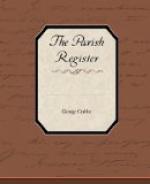And Bibles issued from his private box;
But to his native place severely just,
He left a pittance bound in rigid trust; —
Two paltry pounds, on every quarter’s-day,
(At church produced) for forty loaves should pay;
A stinted gift that to the parish shows
He kept in mind their bounty and their blows!
To farmers three, the year has given a son,
Finch on the Moor, and French, and Middleton.
Twice in this year a female Giles I see,
A Spalding once, and once a Barnaby: —
A humble man is he, and when they meet,
Our farmers find him on a distant seat;
There for their wit he serves a constant theme, —
“They praise his dairy, they extol his team,
They ask the price of each unrivall’d steed,
And whence his sheep, that admirable breed.
His thriving arts they beg he would explain,
And where he puts the money he must gain.
They have their daughters, but they fear their friend
Would think his sons too much would condescend: —
They have their sons who would their fortunes try,
But fear his daughters will their suit deny.”
So runs the joke, while James, with sigh profound,
And face of care, looks moveless on the ground;
His cares, his sighs, provoke the insult more,
And point the jest—for Barnaby is poor.
Last in my list, five untaught lads appear;
Their father dead, compassion sent them here, —
For still that rustic infidel denied
To have their names with solemn rite applied:
His, a lone house, by Deadman’s Dyke-way stood;
And his a nightly haunt, in Lonely-wood:
Each village inn has heard the ruffian boast,
That he believed “in neither God nor ghost;
That when the sod upon the sinner press’d,
He, like the saint, had everlasting rest;
That never priest believed his doctrines true,
But would, for profit, own himself a Jew,
Or worship wood and stone, as honest heathen do;
That fools alone on future worlds rely,
And all who die for faith deserve to die.”
These maxims,—part th’ Attorney’s Clerk profess’d,
His own transcendent genius found the rest.
Our pious matrons heard, and, much amazed,
Gazed on the man, and trembled as they gazed;
And now his face explored, and now his feet,
Man’s dreaded foe in this bad man to meet:
But him our drunkards as their champion raised,
Their bishop call’d, and as their hero praised:
Though most, when sober, and the rest, when sick,
Had little question whence his bishopric.
But he, triumphant spirit! all things dared;
He poach’d the wood, and on the warren snared;
’Twas his, at cards, each novice to trepan,
And call the want of rogues “the rights of man;”
Wild as the winds he let his offspring rove,
And deem’d the marriage-bond the bane of love.
What age and sickness, for a man so bold,
Had done, we know not;—none beheld him old;
By night, as business urged, he sought the wood; —
But to his native place severely just,
He left a pittance bound in rigid trust; —
Two paltry pounds, on every quarter’s-day,
(At church produced) for forty loaves should pay;
A stinted gift that to the parish shows
He kept in mind their bounty and their blows!
To farmers three, the year has given a son,
Finch on the Moor, and French, and Middleton.
Twice in this year a female Giles I see,
A Spalding once, and once a Barnaby: —
A humble man is he, and when they meet,
Our farmers find him on a distant seat;
There for their wit he serves a constant theme, —
“They praise his dairy, they extol his team,
They ask the price of each unrivall’d steed,
And whence his sheep, that admirable breed.
His thriving arts they beg he would explain,
And where he puts the money he must gain.
They have their daughters, but they fear their friend
Would think his sons too much would condescend: —
They have their sons who would their fortunes try,
But fear his daughters will their suit deny.”
So runs the joke, while James, with sigh profound,
And face of care, looks moveless on the ground;
His cares, his sighs, provoke the insult more,
And point the jest—for Barnaby is poor.
Last in my list, five untaught lads appear;
Their father dead, compassion sent them here, —
For still that rustic infidel denied
To have their names with solemn rite applied:
His, a lone house, by Deadman’s Dyke-way stood;
And his a nightly haunt, in Lonely-wood:
Each village inn has heard the ruffian boast,
That he believed “in neither God nor ghost;
That when the sod upon the sinner press’d,
He, like the saint, had everlasting rest;
That never priest believed his doctrines true,
But would, for profit, own himself a Jew,
Or worship wood and stone, as honest heathen do;
That fools alone on future worlds rely,
And all who die for faith deserve to die.”
These maxims,—part th’ Attorney’s Clerk profess’d,
His own transcendent genius found the rest.
Our pious matrons heard, and, much amazed,
Gazed on the man, and trembled as they gazed;
And now his face explored, and now his feet,
Man’s dreaded foe in this bad man to meet:
But him our drunkards as their champion raised,
Their bishop call’d, and as their hero praised:
Though most, when sober, and the rest, when sick,
Had little question whence his bishopric.
But he, triumphant spirit! all things dared;
He poach’d the wood, and on the warren snared;
’Twas his, at cards, each novice to trepan,
And call the want of rogues “the rights of man;”
Wild as the winds he let his offspring rove,
And deem’d the marriage-bond the bane of love.
What age and sickness, for a man so bold,
Had done, we know not;—none beheld him old;
By night, as business urged, he sought the wood; —




